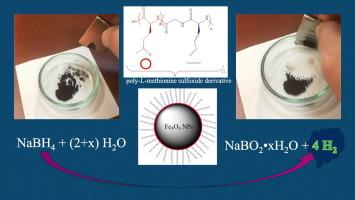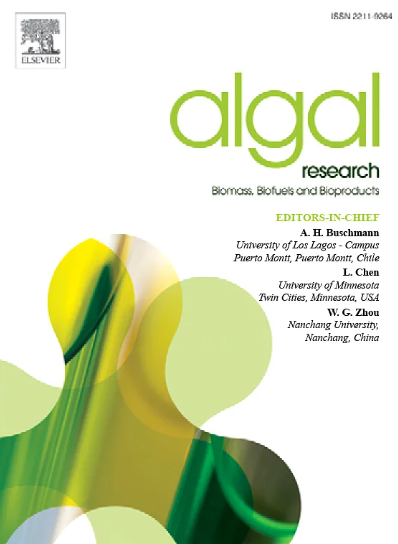浸渍在小球藻上的磁铁矿 Fe3O4 纳米颗粒:在从硼氢化钠水解中获取氢气方面的作用
IF 4.6
2区 生物学
Q1 BIOTECHNOLOGY & APPLIED MICROBIOLOGY
Algal Research-Biomass Biofuels and Bioproducts
Pub Date : 2024-10-12
DOI:10.1016/j.algal.2024.103745
引用次数: 0
摘要
最近,单细胞绿色淡水微藻物种 "小球藻 "因其不同的应用领域而引起了研究人员的关注。其中,研究重点是利用各种技术获取生物氢的技术。本研究首次将小球藻用作磁铁矿 Fe3O4 纳米粒子(Fe3O4NPs@小球藻)的生物支持材料,并在生成的磁铁矿纳米粒子存在下,通过催化水解 NaBH4(硼氢化钠,SB)生产氢气。研究发现,磁铁矿 Fe3O4NPs@ Chlorella vulgaris 的活化能和寿命分别为 23.49 kJ mol-1 和 93,280 mol H2 (mol Fe3O4)-1。在水解 SB 的过程中,没有观察到生物催化剂的化学和物理结构发生变化,因此只对微藻和磁铁矿 Fe3O4NPs@ Chlorella vulgaris 进行了详细表征,计算出催化剂的粒径为 10.19 ± 2.17 nm。结果表明,这些 Fe3O4NPs@Chlorella vulgaris 易于磁分离,催化活性高,是一种 "干净 "的催化剂,在制氢方面令人惊喜。本文章由计算机程序翻译,如有差异,请以英文原文为准。

Magnetite Fe3O4 nanoparticles impregnated on Chlorella vulgaris microalgae: Its role in obtaining hydrogen from the sodium borohydride-hydrolysis
Recently, the single-celled green freshwater microalgae species “Chlorella vulgaris” has attracted the attention of researchers due to its different usage areas. In particular, research focuses on the technology of obtaining bio‑hydrogen with various techniques. This research involves, for the first time, the use of the microalga Chlorella vulgaris as a bio-supporting material for magnetite Fe3O4 nanoparticles (Fe3O4NPs@Chlorella vulgaris) and the production of hydrogen through catalytic hydrolysis of NaBH4 (sodium borohydride, SB) in the presence of the resulting magnetite nanoparticles. Here, detailed kinetic studies were carried out during the SB-hydrolysis by taking magnetite Fe3O4NPs@Chlorella vulgaris and SB in varying amounts and at varying temperatures, and the activation energy and lifetime of magnetite Fe3O4NPs@Chlorella vulgaris was found to be 23.49 kJ mol−1 and 93,280 mol H2 (mol Fe3O4)−1, respectively. No change in the chemical and physical structure of the biocatalyst was observed during the hydrolysis of SB, so only detailed characterization of microalgae and magnetite Fe3O4NPs@Chlorella vulgaris was performed, and the particle size of the catalyst was calculated as 10.19 ± 2.17 nm. The results showed that these Fe3O4NPs@Chlorella vulgaris, which can be easily separated magnetically and have high catalytic activity, are a “clean” and quite surprising catalyst in terms of hydrogen production.
求助全文
通过发布文献求助,成功后即可免费获取论文全文。
去求助
来源期刊

Algal Research-Biomass Biofuels and Bioproducts
BIOTECHNOLOGY & APPLIED MICROBIOLOGY-
CiteScore
9.40
自引率
7.80%
发文量
332
期刊介绍:
Algal Research is an international phycology journal covering all areas of emerging technologies in algae biology, biomass production, cultivation, harvesting, extraction, bioproducts, biorefinery, engineering, and econometrics. Algae is defined to include cyanobacteria, microalgae, and protists and symbionts of interest in biotechnology. The journal publishes original research and reviews for the following scope: algal biology, including but not exclusive to: phylogeny, biodiversity, molecular traits, metabolic regulation, and genetic engineering, algal cultivation, e.g. phototrophic systems, heterotrophic systems, and mixotrophic systems, algal harvesting and extraction systems, biotechnology to convert algal biomass and components into biofuels and bioproducts, e.g., nutraceuticals, pharmaceuticals, animal feed, plastics, etc. algal products and their economic assessment
 求助内容:
求助内容: 应助结果提醒方式:
应助结果提醒方式:


